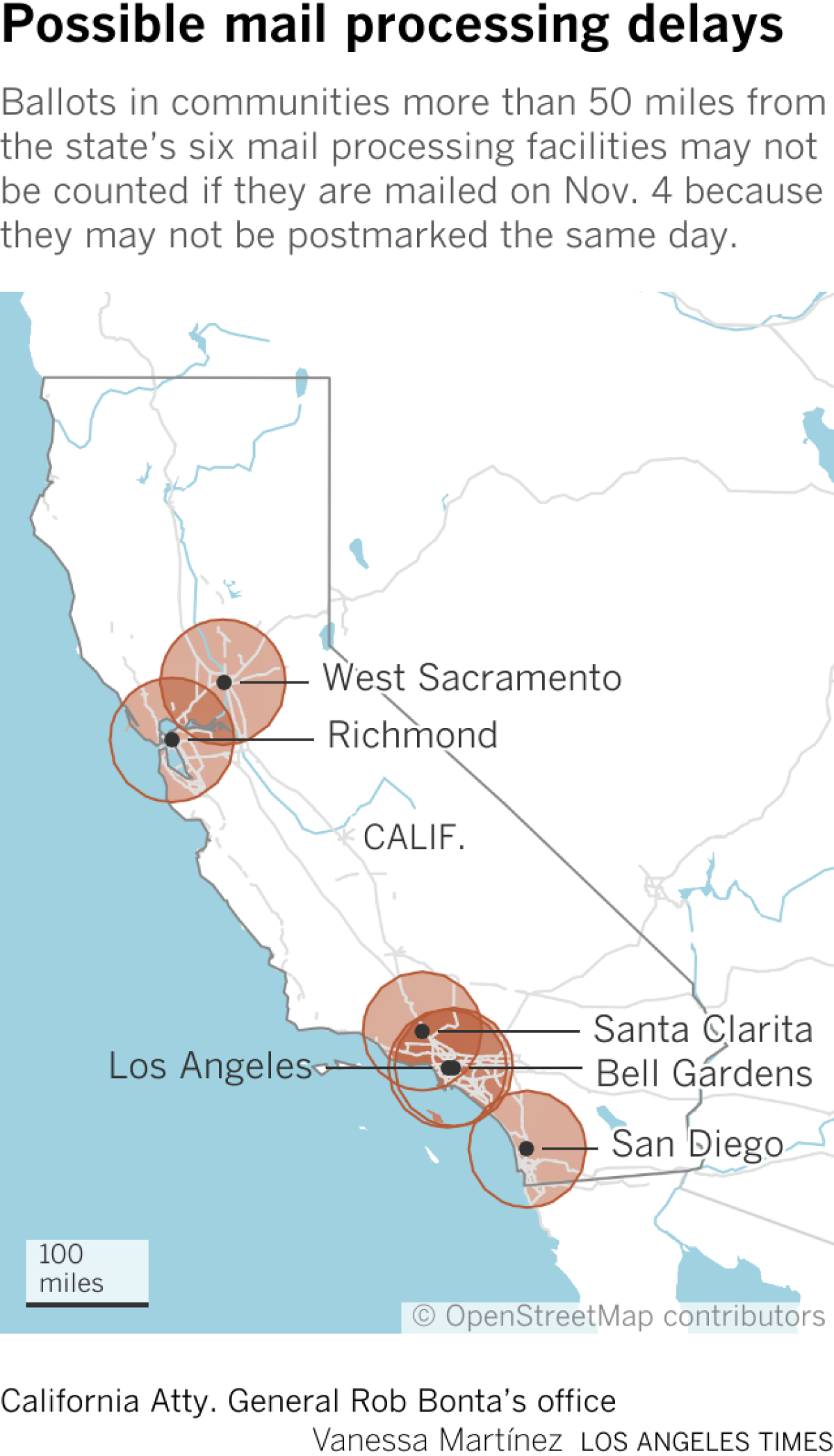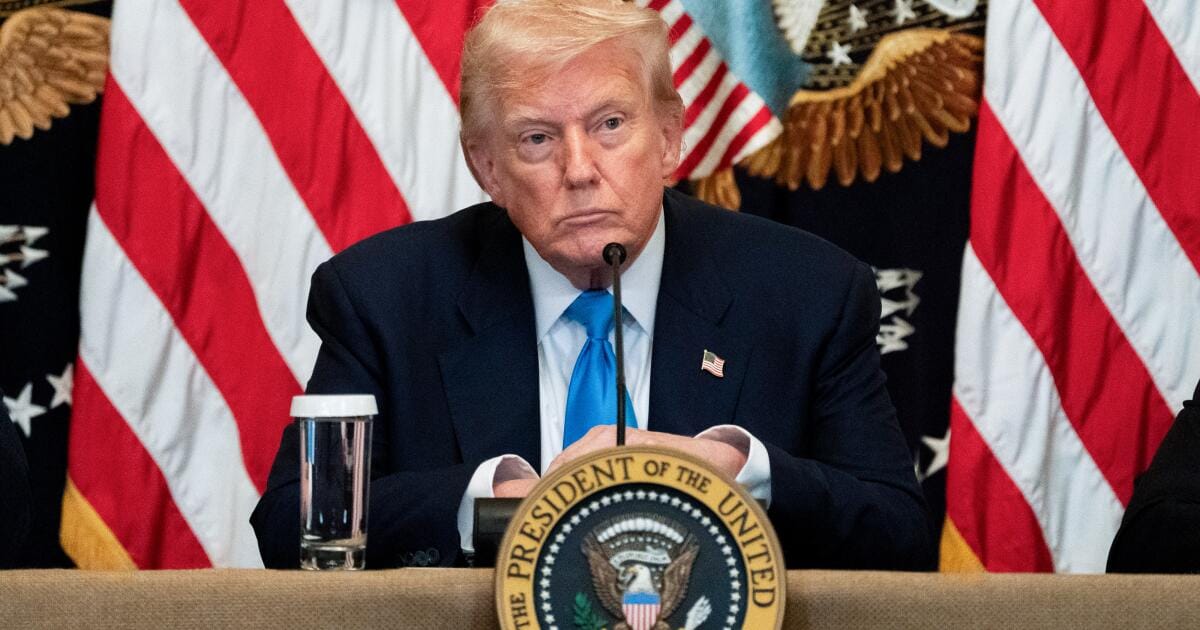Election ballots mailed on Nov. 4 may not be counted, state officials warn
The votes of Californians who drop their ballots in mailboxes on Nov. 4 may not be counted because of U.S. Postal Service processing delays, state officials warned Thursday.
In many parts of the state, a ballot dropped in the mail is now collected the next day, said Atty. General Rob Bonta and Secretary of State Shirley Weber at a news event Thursday.
The change affects voters who live 50 miles or more from six regional mail processing facilities in Los Angeles, Bell Gardens, San Diego, Santa Clarita, Richmond and West Sacramento, according to Bonta’s office.
Ballots that aren’t postmarked on or before Election Day are not counted.
The large swaths of the state affected by the Postal Service changes include both rural and urban areas such as Bakersfield, the Central Valley, the Central Coast, Palm Springs and more.
The warning by state officials to drop off ballots earlier than Election Day marks a dramatic shift in California, where mail-in voting has become accessible and popular. All registered voters in California receive a vote-by-mail ballot.
“If you want your vote to count, which I assume you do, because you’re putting it in the mail, don’t put it in the mail on Election Day if you’re 50 miles from these voting centers,” Bonta said.
In the Nov. 4 special election, California voters will decide on Proposition 50, championed by Gov. Gavin Newsom and other Democrats to try to boost their party’s numbers in Congress by redrawing district boundaries.
The proposal came in response to a redistricting measure in Texas that seeks to increase the number of congressional Republicans at the behest of President Trump.
Postal Service representative Natashi Garvins said in an email that same-day postmarking has never been guaranteed. Garvins said that customers who want a manual postmark should visit a Postal Service location and request one at the counter.
At Thursday’s news event, state officials unveiled a large map with six circles around the mail facilities. Communities located outside the circles are affected by the postmarking change. The Secretary of State’s office wasn’t able to provide a figure for how many registered voters are affected.
Elections expert Paul Mitchell examined the map at The Times’ request.
“This is going to be a significant change for any voters who are outside of these circles that have recently voted by mail on election days,” said Mitchell, who drew the proposed congressional districts that will be before voters on Nov. 4.
Some municipalities have elections on the Nov. 4 ballot in addition to Proposition 50, Mitchell noted.
A news release from the U.S. Postal Service in February outlined some of policy changes, which appear to be part of a 10-year plan rolled out several years ago.
The Postal Service isn’t funded by the government but does receive some money from Congress for certain services.
Bonta on Thursday defended his decision to not immediately inform voters about the changes, arguing that the announcement would have gotten lost in the news cycle.
“Now is a perfect time to tell people about this,” said Bonta. “This is the voting window. This is when people are thinking about voting.”
Weber said her office was only informed “a couple of weeks ago” about the changes.
Ballots will go out to California registered voters starting Oct. 6. Voters can mail ballots, drop them off at a ballot box or take them to a vote center.
Weber on Thursday also responded to questions about faulty voter guides mailed to some voters, which mislabeled a congressional district represented by Rep. George Whitesides (D-Agua Dulce) as District 22 rather than District 27.
Weber blamed the Legislative Analyst’s Office for the error and said her office caught the mistake. About 8 million people will receive postcards informing them of the error, she said, at a cost to taxpayers of about $3 million to $4 million.
Meanwhile, Newsom on Thursday signed a pair of bills that he said will protect elections from undue influence.
Senate Bill 398 by Sen. Tom Umberg (D-Orange) makes it a crime to offer voters financial payments or the chance to win a prize in exchange for casting a ballot or registering to vote.
The new law exempts transportation incentives, such as rides to voting locations, or compensation provided by a government agency to vote.
The bill was introduced in response to Elon Musk’s America PAC announcing in 2024 that it would hold a lottery in swing states for $1 million for those who signed a petition supporting the First and Second Amendments.
The plan was widely criticized as an effort to drive voter registration in favor of then-candidate Donald Trump.
SB 42, also by Umberg, places a measure on the November 2026 ballot asking voters whether the state should repeal its statewide ban on public financing of campaigns.
If voters approve, California could begin considering systems where taxpayer dollars help fund candidates for public office, which supporters say diminishes the power of wealthy donors to sway the outcome of races. Charter cities are already permitted to have public financing programs, with Los Angeles, Long Beach and San Francisco among those that have chosen to do so.
Newsom said the bills are part of a broader push in California to safeguard democracy.
“Right now, our founding ideals and values are being shredded before our eyes in Washington D.C., and California will not sit idle,” Newsom said. “These new laws further protect Californians’ voices and civic participation in what makes our state and our country great.”

